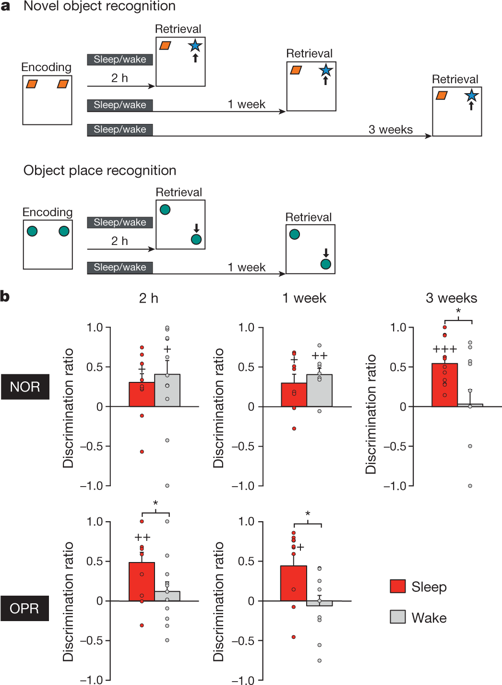Our official English website, www.x-mol.net, welcomes your
feedback! (Note: you will need to create a separate account there.)
The hippocampus is crucial for forming non-hippocampal long-term memory during sleep
Nature ( IF 50.5 ) Pub Date : 2018-11-14 , DOI: 10.1038/s41586-018-0716-8 Anuck Sawangjit , Carlos N. Oyanedel , Niels Niethard , Carolina Salazar , Jan Born , Marion Inostroza
Nature ( IF 50.5 ) Pub Date : 2018-11-14 , DOI: 10.1038/s41586-018-0716-8 Anuck Sawangjit , Carlos N. Oyanedel , Niels Niethard , Carolina Salazar , Jan Born , Marion Inostroza

|
There is a long-standing division in memory research between hippocampus-dependent memory and non-hippocampus-dependent memory, as only the latter can be acquired and retrieved in the absence of normal hippocampal function1,2. Consolidation of hippocampus-dependent memory, in particular, is strongly supported by sleep3–5. Here we show that the formation of long-term representations in a rat model of non-hippocampus-dependent memory depends not only on sleep but also on activation of a hippocampus-dependent mechanism during sleep. Rats encoded non-hippocampus-dependent (novel-object recognition6–8) and hippocampus-dependent (object–place recognition) memories before a two-hour period of sleep or wakefulness. Memory was tested either immediately thereafter or remotely (after one or three weeks). Whereas object–place recognition memory was stronger for rats that had slept after encoding (rather than being awake) at both immediate and remote testing, novel-object recognition memory profited from sleep only three weeks after encoding, at which point it was preserved in rats that had slept after encoding but not in those that had been awake. Notably, inactivation of the hippocampus during post-encoding sleep by intrahippocampal injection of muscimol abolished the sleep-induced enhancement of remote novel-object recognition memory. By contrast, muscimol injection before remote retrieval or memory encoding had no effect on test performance, confirming that the encoding and retrieval of novel-object recognition memory are hippocampus-independent. Remote novel-object recognition memory was associated with spindle activity during post-encoding slow-wave sleep, consistent with the view that neuronal memory replay during slow-wave sleep contributes to long-term memory formation. Our results indicate that the hippocampus has an important role in long-term consolidation during sleep even for memories that have previously been considered hippocampus-independent.Hippocampal activity during a period of sleep after memory encoding is crucial for forming long-term memories in rats, even for types of memory considered not to be hippocampus-dependent.
中文翻译:

海马对于在睡眠期间形成非海马长期记忆至关重要
海马依赖性记忆和非海马依赖性记忆之间的记忆研究长期以来存在分歧,因为只有后者才能在没有正常海马功能的情况下获得和检索1,2。sleep3-5 强烈支持海马体依赖性记忆的巩固。在这里,我们表明在非海马体依赖性记忆大鼠模型中长期表征的形成不仅取决于睡眠,还取决于睡眠期间海马体依赖性机制的激活。大鼠在两小时的睡眠或清醒之前编码非海马体依赖性(新物体识别 6-8)和海马体依赖性(物体-地点识别)记忆。此后立即或远程(一或三周后)测试记忆。虽然在即时和远程测试中,编码后睡觉(而不是清醒)的大鼠的物体 - 地点识别记忆更强,但新物体识别记忆在编码后仅三周从睡眠中获益,此时它在大鼠中得以保留在编码后睡着了,但在醒着的人中却没有。值得注意的是,在编码后睡眠期间通过海马内注射 muscimol 使海马体失活,消除了睡眠诱导的远程新物体识别记忆增强。相比之下,在远程检索或记忆编码之前注射 muscimol 对测试性能没有影响,证实了新物体识别记忆的编码和检索是独立于海马的。远程新物体识别记忆与编码后慢波睡眠期间的纺锤体活动相关,这与慢波睡眠期间神经元记忆重放有助于长期记忆形成的观点一致。我们的结果表明,海马体在睡眠期间的长期巩固中具有重要作用,即使对于以前被认为与海马体无关的记忆也是如此。 记忆编码后睡眠期间的海马体活动对于大鼠的长期记忆形成至关重要,即使对于被认为不依赖于海马体的记忆类型。
更新日期:2018-11-14
中文翻译:

海马对于在睡眠期间形成非海马长期记忆至关重要
海马依赖性记忆和非海马依赖性记忆之间的记忆研究长期以来存在分歧,因为只有后者才能在没有正常海马功能的情况下获得和检索1,2。sleep3-5 强烈支持海马体依赖性记忆的巩固。在这里,我们表明在非海马体依赖性记忆大鼠模型中长期表征的形成不仅取决于睡眠,还取决于睡眠期间海马体依赖性机制的激活。大鼠在两小时的睡眠或清醒之前编码非海马体依赖性(新物体识别 6-8)和海马体依赖性(物体-地点识别)记忆。此后立即或远程(一或三周后)测试记忆。虽然在即时和远程测试中,编码后睡觉(而不是清醒)的大鼠的物体 - 地点识别记忆更强,但新物体识别记忆在编码后仅三周从睡眠中获益,此时它在大鼠中得以保留在编码后睡着了,但在醒着的人中却没有。值得注意的是,在编码后睡眠期间通过海马内注射 muscimol 使海马体失活,消除了睡眠诱导的远程新物体识别记忆增强。相比之下,在远程检索或记忆编码之前注射 muscimol 对测试性能没有影响,证实了新物体识别记忆的编码和检索是独立于海马的。远程新物体识别记忆与编码后慢波睡眠期间的纺锤体活动相关,这与慢波睡眠期间神经元记忆重放有助于长期记忆形成的观点一致。我们的结果表明,海马体在睡眠期间的长期巩固中具有重要作用,即使对于以前被认为与海马体无关的记忆也是如此。 记忆编码后睡眠期间的海马体活动对于大鼠的长期记忆形成至关重要,即使对于被认为不依赖于海马体的记忆类型。































 京公网安备 11010802027423号
京公网安备 11010802027423号